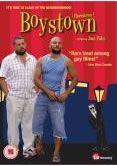Eye For Film >> Movies >> Boystown (2007) Film Review
Murder isn’t the easiest subject to base a comedy around. The risk of going so over the top with the manner and frequency of the bumpings-off that the audience loses any sense of reality is ever-present. As is the risk of adopting such a black, cynical tone that they end up having no sympathy with your characters.
So, ‘bravo’ to Flahn and all involved with Chuecatown, a marvellously spiky yet warm tale of murder, homosexual love and property development in downtown Madrid. It has the off-kilter logic of the Coens at their best, a simple yet involving plot and an air of polite nastiness that recalls the darker reaches of the Ealing canon such as the Ladykillers or Kind Hearts And Coronets.

The principal villain is Victor (Pablo Puyol), a young, sharp-suited estate agent working in the Chueca area of Madrid, the Boystown of the title. It’s become the centre of the city’s gay community, full of young style-conscious couples with plenty of disposable income to spend on doing up their properties. The only trouble is, several of the most desirable apartments are owned by old ladies who have lived there all their lives and are unwilling to sell up.
Victor has a simple solution – he murders them, sells the flats and rakes in the commission. All is going well until one of his victims leaves her property to the local handyman, Rey (Carlos Fuentes – no, not that one). He is a handsome, good-natured but somewhat dim soul, living with his driving instructor boyfriend Leo. Instead of selling the flat, he invites his mum Lola (Mariola Fuentes) to come and live there.
She is the mother from hell - acid-tongued, always interfering and pathologically unable to keep her opinions to herself; even though she’s far from happy with her son’s sexuality, she’s still convinced that if he has to be gay he could do a lot better for a boyfriend than the pudgy, unambitious Leo.
Seeing how the land lies, Victor cultivates Leo’s acquaintance and pretends to be attracted to him, playing on his insecurities over the relationship. He encourages him to dress more sharply and cultivate an interest in design and architecture, all the while attempting to drive an even bigger wedge between Leo and Lola and seize on any chance to make her the latest victim...
Throw in a host of bizarre supporting characters, including Leo’s homophobic boss, who’s also passionately in love with Lola, and a police investigation team comprising a domineering, hypochondriac mother and her ‘so repressed he doesn’t even realise he’s IN the closet’ son and you have a mixture that could result in a grotesque mess but is kept tightly controlled at all times by Juan Flahn and co-writer Dania Ayaso.
Credit also to the cast, who ground in reality characters that could easily slip into caricature. Puyol, radiating charisma and self-confidence in a manner that recalls the young John Cusack, is a great satirical portrait of the amoral, status-obsessed young professional who exists and thrives in every big city. But he’s also a credibly cunning and dangerous villain, with the sense of genuine menace that good black comedy requires.
Fuentes and Nieto make a believable and engaging couple, constantly bickering and harping on about the baggage of previous relationships, but also genuinely in love. And Lola is a tour de force – appalling, yes, but also feisty and full of life. Her potty-mouthed tirades against the hapless Leo, her pliable son and, indeed, anyone who rubs her up the wrong way are worth the price of rental alone.
The influence of Pedro Almodovar is obvious, occasionally a little too much so – are there any Spanish people who aren’t eccentric and/or sex-obsessed? But Flahn also draws on the classic acid-tipped comedies of an earlier age - the aforementioned Ealing classics and Jack Smight’s under-rated No Way To Treat A Lady, with its ‘women of a certain age’ victims and mummy’s boy police adversary. There’s even a nod to the original Pink Panther in the animated credits and groovy, Mancini-esque score.
The climax is a bit over-extended and some of the supporting cameos work better than others, but by and large this is a warm, engaging and at times genuinely tense film with some interesting things to say about Spain’s burgeoning gay scene, its matriarchal society and the clash between a style and status–obsessed approach to life and one that celebrates community, family and love, regardless of sexuality. And it’s very, very funny. To my mind, undoubtedly the best Spanish comedy about murdering pensioners ever – until Guillermo del Toro decides to remake The Ladykillers, of course.
Reviewed on: 19 Nov 2008



















